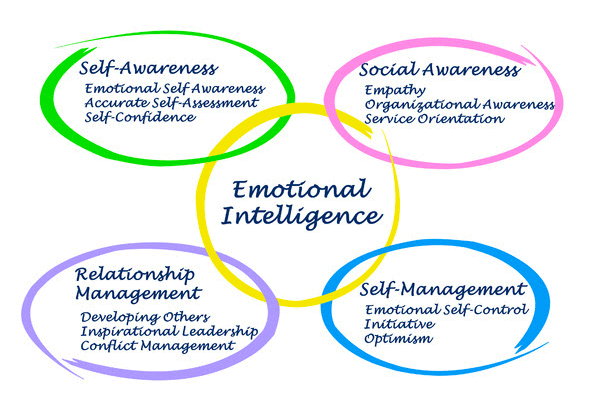Intelligent leadership has its roots in emotional intelligence. Find out which dimensions of intelligent leadership depend and thrive on emotional intelligence.
Overview: Emotional intelligence is the source of many skills and dimensions that define intelligent leadership. Self-awareness, empathy, and social skills directly influence inspirational motivation, individualized consideration, and intellectual stimulation. Only an emotionally intelligent person can be an effective leader.
Emotional intelligence is the type of intelligence that allows us to recognize our emotions and the effects they exert on our decisions. Emotionally intelligent people also understand the emotions of those around them and how these emotions influence the decisions of others.
Emotional intelligence helps people adapt to situations and other people while thinking critically and making optimal decisions.

Emotional intelligence defines many leadership skills.
There is No Intelligent Leadership without Emotional Intelligence
In my leadership development books, I have defined emotional intelligence as the fourth outer-core leadership competency. As such, it is one of the pillars of intelligent leadership.
The inner-core leadership skills that combine to give birth to emotional intelligence are:
- Self-awareness. The ability to understand your own emotions gives you control over them. Self-awareness allows you to avoid emotional pitfalls and biases.
- Self-regulation. Once you are aware of your emotions and understand how they impact your actions, you gain control over them. When you exercise this control, you self-regulate.
- Motivation. This emotional tendency allows you to chase goals persistently, take the initiative, and overcome setbacks.
- Empathy. An essential component of emotional intelligence, empathy allows you to put yourself in the proverbial shoes of others. By understanding the emotions of those around you, you understand their motivations and actions better.
- Social Skills. This set of specific skills allows you to interact with others and manage your relationships. Leaders who have well-developed social skills find it easier to induce favorable and desirable responses in others. Social skills are not about persuasion alone; they also cover listening skills, communication, and the ability to build lasting, meaningful relationships.
The Links between Emotional Intelligence and Intelligent Leadership
Understanding the makeup of emotional intelligence allows us to comprehend how it impacts intelligent leadership.
There are concrete and straightforward connections between the emotional skills that make up EI and various dimensions of intelligent leadership.
- Self-awareness relates directly to individual influence and intellectual stimulation. Since self-awareness is so closely intertwined with self-regulation, we can say the same about the latter.
- Empathy acts as the source of individual consideration.
- Motivation is essential for inspiration.
Intelligent Leadership Dimensions that Depend on EI
Idealized influence is a prominent trait of intelligent leaders. Leaders that have this trait act as role models for their followers due to their ethical behavior and high standards. Idealized influence makes followers want to emulate the actions and behaviors of their leaders.
Intelligent leaders stimulate their followers intellectually. Effective leadership requires the constant challenging of assumptions and exchanging of ideas. Taking calculated risks is also part of effective leadership. Intelligent leaders value creativity in the service of innovation.
Individualized consideration is an indispensable ingredient of coaching-focused organizational cultures. Leaders who master this EI-rooted trait consider the needs of their reports individually, acting as a mentor and coach. Individual consideration allows leaders to be aware of the unique talents and assets their reports add to the organization.
Individualized consideration is the basis of coaching.
Inspirational motivation stems from the motivation of the leader and describes the ability of the latter to articulate compelling visions that inspire followers to align their priorities with the company goals and consistently deliver their best work.
Motivating and inspirational leaders are optimistic about outcomes and the abilities of their followers. They are good at empowering employees and giving them a strong sense of purpose.
Emotional intelligence is one of the cornerstones of intelligent leadership. Instead of an autocratic, top-down approach that alienates followers, it seeks to engage everyone on an emotional level, providing genuine empowerment and motivation. Leaders lacking emotional intelligence fail to build meaningful connections with their followers and may sabotage the goals of their organizations.
The “intelligent” part of intelligent leadership refers to emotional intelligence and its ubiquitous presence in every aspect of effective leadership.
To learn more about how you can join the IL Movement as a coach, or how you can benefit from bringing IL Solutions to your organization, contact us today.


